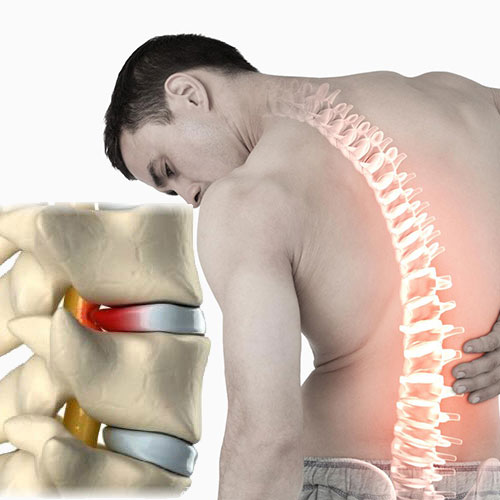Lumbar herniated disc
Lumbar herniated disc

Lumbar herniated disc is moving of the disc from interdisc space of the lumbar part of the spine and this can result in compressing the nerve root.
According to the literature data, even about 80% of population, being younger or older, complains about pain and stiffness in lumbar spine, with or without leg pain which mostly occurs due to herniated disc. Due to degenerative changes in intervertebral disc, when it is overloaded or spontaneously, connective lining of intervertebral disc may be ruptured, its soft portion may protrude through the ruptured connective lining of the intervertebral disc into the spinal canal – DISCUS HERNIA – and neural elements in the canal may be damaged.
Discus hernia most often occurs in lumbar spine and it is the most common cause of back pain. Given that it usually occurs in working-age population, 30 to 50 years old, it has great medical and socio-economic significance. Dominant symptoms of lumbar herniated disc are pain in lumbar area, with or without extension into a leg, which usually comes sudden after lifting some load, and sometimes it comes spontaneously, then occurrence of sensitive and motor dysfunction, limited movability of lumbar spine, tension of the back muscles. Sitting, standing and walking are all difficult.
With aging, discs lose water, their elasticity decreases, and loading of discs during life (hard physical works or works related to continuous sitting) contribute to this process, defined as disc degeneration. Numerous risk factors have influence on the development of lumbar herniated disc, such as age, heritage, hard physical work, as well as work where body is in unfavorable, forced positions, work with vibrations, poor micro and macro climate conditions, overweight, smoking, psycho-social factor such as depression, stress.
Most common symptoms of lumbar herniated disk include:
- Lower back and leg pain,
- Decreased and lost sensitivity (numbing) in the affected area of compressed nerve root,
- Impaired feet movability,
- And in the worst cases, urine and stool passing and potency in men may be impaired.
Pain is very intensive, flashing and long-lasting. It increases during coughing and sneezing. It often disables normal sleep, moving. Along with pain, decreased sensitivity and numbing may occur, and weakness in the feet is possible as well. Urine and stool passing as well as potency in men are the most severe, but luckily the rarest symptoms of lumbar herniated disc.
Lumbar herniated disc management may be conservative and surgical.
The emphasis in the treatment should not be only to relieve pain, but to reach maximum functional recovery, which can be achieved with complex balneo-physical treatment, which is successfully exercised in our institution. In addition to electrical, magnetic, laser, sono and mechanic therapy procedures, used to relieve pain, swelling and inflammation, we also apply Horizontal Therapy, a new form of electric therapy helping in faster pain relief. Warm sulphuric mud and water of our spa relax tensed muscles, relieve pain, improve blood circulation, and provide nutrients for muscles and nerves, hence making the recovery faster. Patients are trained with a corresponding program of exercises, and educated on protective positions and moves.
We recommend the following to our patients: regular exercising at home, applying protective positions and moves in everyday life, avoiding forced body positions, avoiding lifting and carrying loads, as well as regular spa treatment in order to prevent relapse of the disease.
